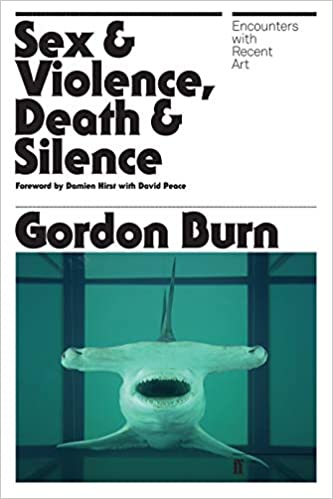FICTION by GORDON BURN
Alma Cogan (1991)
Synopsis: How does it feel to be never allowed to die? In his classic début novel, Gordon Burn takes Britain's biggest selling vocalist of the 1950s and turns her story into an equation of celebrity and murder. Fictional characters jostle for space with real life stars - from John Lennon to Doris Day and Sammy Davis Jnr - as Burn, in a breathtaking act of appropriation, reinvents the popular culture of the post-war years. As beautifully written as it is disturbing, Alma Cogan remains a stingingly relevant exploration of the sad, dark underside of fame.
Reviews:
‘If Gordon Burn had simply risked this much and failed, you’d have to love this dream memoir for its daring alone. But to have succeeded so brilliantly makes Alma Cogan a novel to treasure. As a dark meditation on fame and its undertow, as a dangerous and loving vision of post-war England, as a ruthless antitode to nostalgia, it’s unlike anything I’ve ever read.’ Michael Herr
‘While you are reading this book, it colours your whole view of the world. It is an extraordinary effort of imagination. It reminds you how powerful a novel can be…No other novel has displayed the originality and power of Alama Cogan. This is my book of the year because it is the one I desperately wish I had written.’ Hilary Mantel, the Spectator
'In a bravura feat of imaginative reconstruction Gordon Burn has taken the idea of celebrity-as-affliction a step further and pursued one of its victims beyond the grave…. At considerable risk, Gordon Burn has turned over the furniture of modern iconography – ironically his book may well consolidate the phenomenon it seeks to condemn. Alma Cogan tears off celebrity’s mask and examines what lurks beneath: not the fear of being forgotten, but the dread of not being allowed to die.' Anthony Quinn, London Review of Books
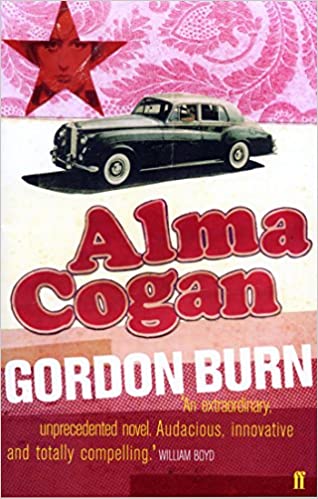
'An extraordinary, unprecedented novel which breaks through the barrier between fact and fiction with remarkable confidence and power. Audacious, innovative and totally compelling.'
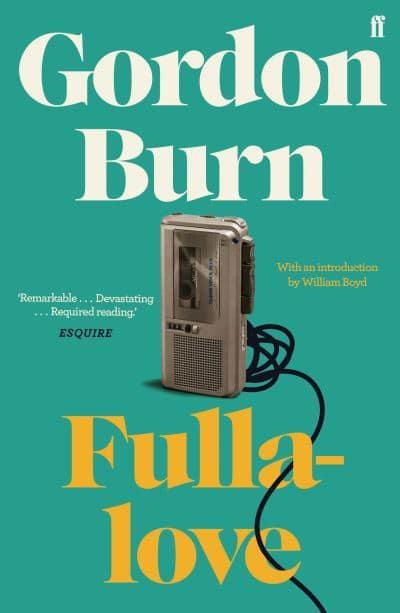
Fullalove (1995)
Synopsis: Norman Miller used to be one of Fleet Street's finest. Now he's a middle-aged, burned-out hack with a gift for the sensational story, the shouting tabloid lead. But as he reports on a series of brutal murders and sex crimes, he's forced to wonder whether he is just a witness - or part of some deeper pattern of cause and effect . . .
Reviews:
'Remarkable . . . Devastating . . . Required reading for anyone interested in what British fiction should be doing today.' Stephen Amidon, Esquire
'Memorable…dazzling story of a ‘wall-shinning, nose-poking, leg-in-the-door’ tabloid hack, a ‘colour man’ sent to the scene of the latest ‘nail-bomb or child-snatch or brutal sex-death’.' Theo Tait, London Review of Books
'Fullalove is -- among other things -- a shriek of hyper-literate rage against a culture that can spawn "perceptive" books about evil that should strike us dumb... one of the year's most richly imagined and provocative novels." Boyd Tonkin, New Statesman
'Fullalove is nothing if not upfront about what it's doing thematically, with the salient concepts underlined by characters' discussions. It's about new primitivism, atavistic quasi-religious behaviour, and the often heartfelt nature of kitsch. It's about the role of crime in giving us our folk-memories, our mythology, and our sense of community. And it's about the obscenity of the mass media (.....) a rich and awesome work, so intensely, almost fatiguingly, brilliant that its black dazzle keeps the reader wavering between exhilaration and burn-out." Phil Baker, Times Literary Supplement
The North of England Home Service (2003)
Synopsis: In a forensic dissection of Britain's souring landscape Gordon Burn tells the tale of Ray Cruddas, a light entertainer effecting a semi-dignified retreat from his fading career, who returns to the unnamed northern town of his youth.
Reviews: 'The history he presents, using a mixture of the actual and the imagined, and at times wielding an Orwellian eloquence, is worth the price of the book in itself.' Sean O'Brien, The Independent
'The author moves in this landscape with an uncompromising documentary intelligence. He interrogates its symbols (...) with a virile curiosity and an edgy sense of political history. Nothing, not a joke or a jogger, is let off lightly. It is a book that feels as if it were written on foot, every sentence exhibiting a lifetime of close observation and streetwise wit.' Tim Adams, The Observer
'The true blight of this impressive and quietly raging novel is the blight inside, the death of hope and expectation, the blight of a nation consumed by its need for easy gratification, and, above all, the blight of people suddenly unsure of themselves and of their own true place and purpose in the world.' Robert Edric, The Spectator
'Burn, an astute commentator on the topographical shifts and attendant social ramifications caused by the collapse of heavy industry in the North East, is far too intelligent a writer to endorse a simplistic binary opposition between a golden past and tarnished present. Instead he makes individual human relations his primary concern. In a book thick with intelligent metaphor, the use of Beckett’s Waiting for Godot is its only sacrifice to the blatant.' Chris Power, The Times
'A hypnotic assembly of glimpses, anecdotes, recollections, pictures; but as you read, you never lose sight of the images that put you on the edge of your seat on page one.' M.John Harrison, Times Literary Supplement
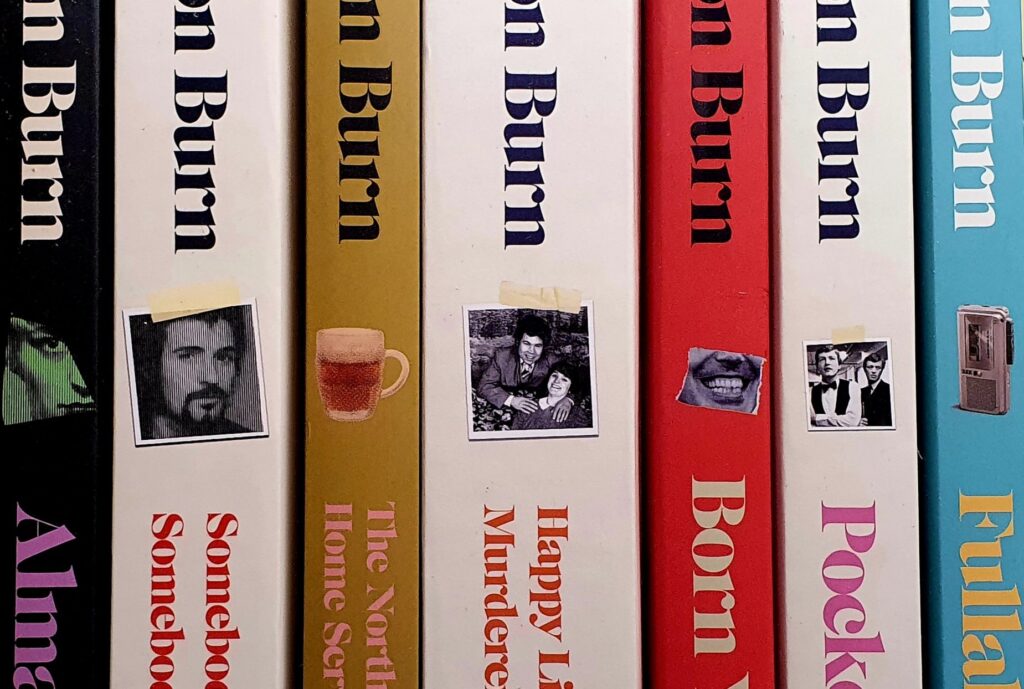
Born Yesterday: The News as Novel (2008)
Synopsis: Summer 2007 was an extraordinarily rich time for news. Floods. Foot and mouth. The disappearances of Tony Blair and Madeleine McCann. The arrival of Gordon Brown. Terror attacks in Glasgow. And Gordon Burn, artist, journalist and true-crime author, has taken the events from this bleak summer and turned them into an utterly unique novel about the way news is made, and how the media creates and manipulates the stories we see before us. A daring and thrilling novel from one of the most astute observers of celebrity and tragedy, that is sure to make the headlines itself.
Reviews: 'Quoting selectively doesn’t do justice to a bravura passages that work by their accretion of big ideas and weird local detail. The writing is often relentless and incantatory, but it is also sharp-eyed and full of vivid particularity... From time to time, I even found myself excitedly wondering whether Gordon Burn hadn’t written a sort of Waste Land for the rolling news era.' Theo Tait, London Review of Books
'Original and disturbing. Perhaps this will be the form the novel of the future takes: a collection of hard bright pixels to replace the old first-person story that has up to now been fiction's badge of authenticity.' Lindsay Duguid, The Sunday Times
'A brilliant polemic on the dangers of blurring the distinction between public and private life.' Michael Arditti, The Daily Mail
'While you are reading this book, it colours your whole view of the world. It is an extraordinary effort of imagination. It reminds you how powerful a novel can be'…
NON FICTION
Somebody's Husband, Somebody's Son: The Story of Peter Sutcliffe (1984)
Synopsis: It seemed the case of the notorious Yorkshire Ripper was finally closed when Peter Sutcliffe was sentenced to life imprisonment in 1981. But in the early 1980s Gordon Burn spent three years living in Sutcliffe's home town of Bingley, researching his life. A modern classic, Somebody's Husband, Somebody's Son offers one of the most penetrating and provocative insights into the mind of a murderer ever written.
Reviews: 'A book which will, with some justice, be compared to In Cold Blood and The Executioner's Song. It's as if Thomas Hardy were also present at the writing of this account of the Yorkshire Ripper.' Norman Mailer
‘We come to know all these people as we might characters in a novel, and the book picks up a narrative current that keeps the reader turning the pages.’ Patricia Highsmith, London Review of Books
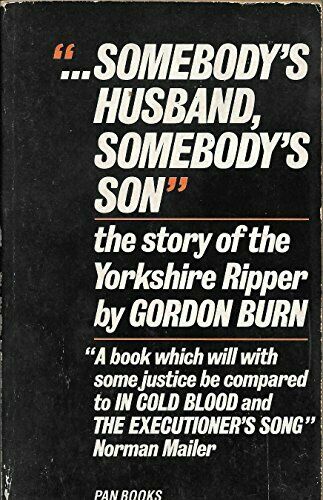
Pocket Money: Inside The World Of Snooker (1986)
Synopsis: 1985, and following 'that' final - between Dennis Taylor and Steve Davis - Britain suddenly found itself in the grip of a new sporting obsession. Snooker or 'Coronation Street with balls' was big business, and with TV looking to cash in, 1986 was to be a crucial year. In one corner was Barry Hearn and his Romford Mafia - Davis, Taylor, Griffiths - and in the other were the bad boys - Higgins, White and Knowles - threatening the game's good name, and its earning potential.
For one year, Gordon Burn travelled with this snooker circus, from Hong Kong and China to out of season resorts in the north of England and on to the season's finale in Sheffield. With unprecedented access to the leading players and personalities involved, Pocket Money affords a unique snapshot into an extraordinary time and place.
Reviews: 'A portrait of the world of snooker in its first flourishing, when the Hurricane blew, the Whirlwind whizzed and Steve Davis was more than interesting…this book offers not only a snapshot of a sport at a critical time in its evolution, but also a sample of a writing career in its early stages. During the year that he spent following the snooker players around the world, the young Burn was clearly in his element. He relishes Hearn's energy and Taylor's humour, and empathises with the humility of Bradford's unknown world champion, Joe Johnson.The author's descriptive skills are formidable... It is a slim work, but every page works hard.' Andrew Baker, The Telegraph
Happy Like Murderers: The Story Of Fred And Rosemary West (1998)
Synopsis: On 26 February 1994 the remains of Heather West were discovered in the garden of the house at 25 Cromwell Street in Gloucester where she had lived with her seven brothers and sisters, her mother Rosemary and her father Fred. Over the next days the remains of eight other women were found buried and 25 Cromwell Street became known as the 'House of Horror'.
Fred West hanged himself in prison before the charges against him of child-rape, sexual abuse, torture and murder could be heard. On conviction, his wife became known as the most depraved woman on Earth. In Happy Like Murderers Gordon Burn reveals for the first time the strange inner dynamic of the Wests' relationship throughout their long life together. Was Rosemary West a vicious, sadistic and insatiable bisexual, her husband's full partner in the lust murders of women and young girls? Or was she a physically and psychologically tormented obedience slave, shaped by him and her own submissive dependence into something compliant and corrupt?
Reviews: 'Long, brilliant, horrifying... Burn has researched with great care every detail (my God, the detail) of what went on in the Wests' household over decades.' Libby Purves, The Times
'Quite brilliant Happy Like Murderers is a non-fictional account of the Wests’ somewhat questionable lifestyle choices. It is one of the finest pieces of writing by a living English writer, the cold blank prose and the use of repetition (again) eventually numbing the reader into a peculiar state of understanding.' Rod Liddle
'With his forensic commitment to get behind the tabloid headlines... Burn brilliantly reinvents reportorial writing... Startlingly original.' Matt Seaton, Esquire
'Brilliant, bleak, unflinching... Layer after layer, level after level, deeper and deeper, until, at last, a picture is constructed... His interpretations make sense. They feel right. They explain the inexplicable.' Deborah Orr, The Guardian
On The Way To Work (with Damien Hirst) (2001)
Synopsis: 'I want it to be revealing. I'll talk about anything you like. I want it to be truthful. Let's do it. There is no off-limits. I'm afraid of nothing.' Immediately recognised as a young artist with a brilliant, sordid and uncompromising imagination, Damien Hirst is the most celebrated artist Britain has produced for generations. The undisputed leader and originator of the dominant movement in contemporary art on both sides of the Atlantic, he is now so ingrained in the public consciousness that even those with only a passing interest in art are familiar with his notorious shark and pickled sheep. Gordon Burn met Hirst for the first time nine years ago. Both admirers of David Sylvester's interviews with Francis Bacon and Jan Wenner's interviews with John Lennon, there was always an unspoken understanding between them that they would do something similar when the time was right. The resulting conversations in On the Way to Work are electrifyingly candid. True to the undertaking Hirst gave Burn, there is no off-limits: here are Hirst's thoughts on celebrity, money, art, alcohol, sex, death, the North of England, class, crime and cocaine; his views on Marco Pierre White, Charles Saatchi, David Bowie, Gilbert and George and Lucian Freud. More than any other individual, Damien Hirst's art and life came to define the nineties. Like the generation Hirst has come to represent, On the Way to Work is brave, unpredictable, scabrously funny and corrosively intelligent. It is also a how-to guide to becoming the most famous artist in the world.
Best and Edwards: Football, Fame And Oblivion (2006)
Synopsis: In Best and Edwards, Gordon Burn looks at two of football’s brightest talents. United by the club they played for, but divided by the tragedy of Munich, they came in very different ways to embody their respective generations. In plotting the course and trajectory of these two careers, Gordon Burn has produced a brilliant and startlingly original look at football and British culture.
Reviews: 'Burn is one of the best writers in the country, and it seems inevitable, in a way, that he would have turned his attention to this subject… This is a rueful, melancholy reflection on the nature of genius and of fame: of the very different approaches taken at different times in the game's history.' Nicholas Lezard, The Guardian
Sex and Violence, Death and Silence (2009)
Synopsis: ‘Pop art was famously about "liking things", as Warhol once said. The first American Pop artists, like their English counterparts, were looking outward at the world around them rather than focusing on their emotional reactions to it. They were among the first to understand the desire of consumers to change their lives through the purchase of clean, manufactured commodities. YBA, on the other hand, was more interested in the dirt that accrues beneath the laminate surface of shiny things. Its artists were drawn to abject and degraded materials, to the banal and dejected, to signifiers of death and decay. The trick, though, was to tell it in a jaunty, unportentous, offhand, unliterary - anti-literary - way ... And then there were the drugs.’ Spanning nearly thirty-five years, Sex & Violence, Death & Silence is a collection of the best of Gordon Burn’s writing on art. Focusing on two principle generations - the Royal College Pop art of Hockney and his contemporaries, and the YBA sensations of the 1990s - it explores how these artists rose to prominence with their friends and contemporaries, and what happened next. Burn’s work is fast becoming a kind of chronicle. Its factuality always connects with the broader poetic rhythms of cultural life. Displaying all his customary insight and empathy, his writing adds up to much more than a collection of pieces on art: superbly evocative and engaging, it offers a pathway through two of the most important and vibrant periods in recent art history, and is another compelling and ruminative look at our culture.
Reviews: 'A fresh overview of recent art… it offers an intimate, gossipy introduction not just to our most famous but to some of our most forgotten talents. Here is David Hockney shuffling about in his slippers and swigging at a bottle of brown ale, or Damien Hirst at his very first encounter with Jay Jopling, or Tracey Emin lamenting the destruction of her tent. Burn’s talent is to make his readers feel like insiders, too.' Rachel Campbell Johnston, The Times
'The point the book makes is that whatever you think of the art it concerns itself with, it has, like it or not, penetrated the public consciousness. And… will remain, one of the movement's essential documents.' Nicholas Lezard, The Guardian
To purchase these titles go to faber.co.uk
